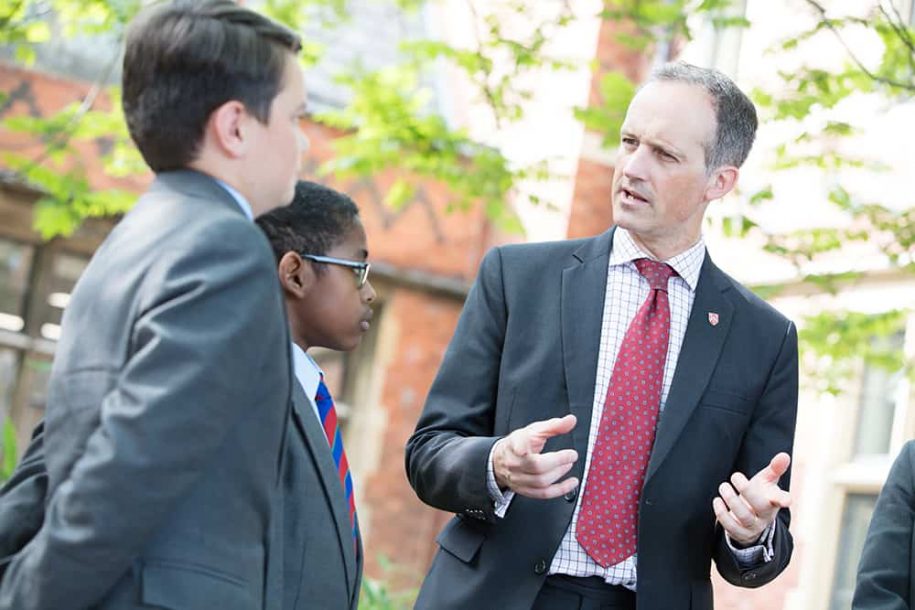Helicopter, Tiger or Dolphin?

<strong>Helicopter, Tiger or Dolphin?</strong>
<strong> </strong>Being a parent is hard. I vividly recall the panic of taking my baby home from hospital at 2 days old, wondering how on earth I was supposed to know what to do. Where was the manual? It certainly doesn’t get any easier as our sons reach teenage years. We can be highly critical of our own deficiencies as parents, and we’re never quite sure whether, on the one hand, we should be stricter with our children, reasoning that ‘it didn’t do us any harm’, or whether we should give them some space to be children and to learn from their own mistakes. It doesn’t help that parents come in for a lot of external criticism these days for the style of parenting that they choose from politicians, the media and, dare I say, educators.
We use a range of analogies to describe parenting styles. The ‘tiger mother’ is the phrase I like least, probably because the word ‘tiger’ never seems to be applied to fathers, even though there is no reason why the characteristics of the tiger cannot apply to either sex. These are strict, demanding parents who push their children to be academically successful using authoritarian parenting methods. The phrase became popular a decade ago following the publication of <em>Battle Hymn of the Tiger Mother</em> by Yale Law professor Amy Chua. A Chinese-American, Ms Chua’s book is actually a humorous account of how she wasn’t actually very successful in bringing her children up with the type of traditional authoritarian Chinese parenting that she had experienced herself.
Similar in some ways to the tiger is the ‘helicopter parent’, who is constantly hovering over their child’s head, seeking to solve any problem that he or she encounters, however trivial. The argument is that this is harmful because the child never learns to fight his own battles, especially during adolescence when the gradual development of independence and self-sufficiency is essential for future success and happiness. A key difference in these two concepts is that, while the tiger parent tends to value success over happiness, nobody doubts the helicopter parent’s love and care for their child. This hovering around the child’s head is done precisely because the parent wants the child to feel fulfilled and happy, as well as successful.
Among the middle-classes, parents can sometimes feel that parenting is competitive. We can feel guilt as soon as our children begin at primary school if we are too passive in their parenting, and if our children aren’t doing the after-school activities designed to develop mind, body and soul that our friends’ children are undertaking. Some of us are rebelling against this, and I have written previously in my blog of the value of giving your sons some space during their holidays and of avoiding the temptation to over-stimulate them with non-stop activity (as long as the electronic babysitter is switched off too!) We also need to beware of attempts to eliminate risk from our sons’ lives. They need to learn how to get home after dark, and how to travel independently from one town to another.
As with most things in life, there is a danger in resorting to an extreme approach, whether excessively authoritarian or permissive. The answer is presumably for us to employ different parenting styles as needs dictate. A couple of years ago I read ‘The Dolphin Way’ by Canadian child psychologist, Dr Shimi Kang. The dolphin is social, playful and intelligent, swimming with its young and guiding them gently. According to Dr Kang, dolphin parenting provides a balance between the strict tiger and the lack of rules and expectations that characterise what she calls ‘jellyfish parents’. Dolphin parents avoid overscheduling activities for their children, refrain from being overprotective and take into account their children’s desire and goals when setting expectations for behaviour and academic success. We must not be afraid of allowing our children to fail from time to time. Although I don’t advocate this with GCSEs or A Levels, I know that failing Grade 8 piano was a formative experience in my life, which I have tried to avoid repeating!
Naturally, it is a good thing that parents are much more closely involved in their children’s lives than might have been the case in the past. We wouldn’t want to be the type of stereotypically austere Victorian parents who never show their children any love. The danger is that, with tiger parenting, children can feel that a parent’s love is conditional on achievement. We therefore have to think about how we assure them that they have innate value in being themselves, and to show them most love when things don’t go according to plan.
